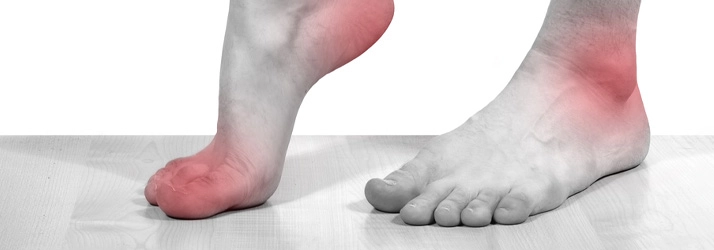Plantar Fasciitis in Louisville KY

What is Plantar Fasciitis in Louisville KY? Plantar Fasciitis is a common foot condition characterized by inflammation and irritation of the plantar fascia, a thick band of tissue that runs across the bottom of the foot, connecting the heel bone to the toes. This condition is a leading cause of heel pain and is particularly prevalent among athletes, runners, and individuals who spend long hours on their feet.
What causes Plantar Fasciitis?
Plantar Fasciitis is primarily caused by the irritation and inflammation of the plantar fascia, a thick band of tissue that supports the arch of the foot. The exact cause of plantar fasciitis can vary among individuals, but some common contributing factors include:
- Repetitive Strain: Engaging in activities that involve repetitive stress on the feet, such as running, jumping, dancing, or standing for extended periods, can lead to micro-tears and irritation in the plantar fascia.
- Foot Structure: Certain foot structures can increase the risk of developing plantar fasciitis. Flat feet (low arches) or high arches can alter the distribution of weight on the feet and put added stress on the plantar fascia.
- Tight Calf Muscles: Tightness in the calf muscles can limit ankle flexibility, leading to increased tension on the plantar fascia during movement.
- Obesity: Excess body weight can place additional pressure on the feet, increasing the strain on the plantar fascia.
- Improper Footwear: Wearing shoes with inadequate support or cushioning, or wearing high heels regularly, can contribute to the development of plantar fasciitis.
- Sudden Increase in Activity: Rapidly increasing the intensity, duration, or frequency of physical activities can strain the plantar fascia and lead to inflammation.
- Age: Plantar fasciitis is more common in individuals between the ages of 40 and 60.
- Occupation: Certain occupations that require prolonged standing or walking on hard surfaces can increase the risk of plantar fasciitis.
- Poor Foot Biomechanics: Abnormal foot mechanics, such as overpronation (excessive inward rolling of the foot) or supination (excessive outward rolling of the foot), can stress the plantar fascia.
What are the symptoms of Plantar Fasciitis?
Plantar Fasciitis typically presents with the following symptoms, which primarily affect the bottom of the foot and the heel:
- Heel Pain: The most common symptom of plantar fasciitis is sharp, stabbing, or burning pain in the heel. The pain is usually felt on the underside of the heel and can extend along the arch of the foot.
- Pain with First Steps: The pain is often most severe when taking the first steps in the morning after waking up or after periods of rest. It may also worsen after prolonged periods of standing or activity.
- Stiffness: Many individuals with plantar fasciitis experience stiffness and discomfort in the foot, particularly in the morning or after sitting for a while.
- Pain with Activity: The pain may subside or improve with light activity or movement but can intensify during more vigorous activities.
- Tenderness: The affected area of the heel may be tender to the touch.
- Limited Range of Motion: Some individuals may experience reduced flexibility and limited range of motion in the foot due to the pain and stiffness.
- Pain Relief with Rest: Resting the foot and elevating it can provide temporary relief from the pain.
How can we treat Plantar Fasciitis in Louisville KY?
Pulse wave treatment (PWT) is a non-invasive treatment that uses high-pressure sound waves to improve blood flow and tissue repair. It is a promising treatment for plantar fasciitis, a condition that causes pain in the heel and arch of the foot.
PWT works by increasing blood flow to the affected areas. This helps to deliver oxygen and nutrients to the tissues, which can help reduce inflammation and pain. PWT can also help stimulate the growth of new tissue, which can improve the strength and flexibility of the plantar fascia.
There is some evidence to suggest that PWT can be an effective treatment for plantar fasciitis. A study found that PWT was effective in reducing pain and improving function in patients with plantar fasciitis. Another study found that PWT was effective in reducing pain and improving quality of life in patients with plantar fasciitis.
However, more research is needed to confirm the effectiveness of PWT for plantar fasciitis. Currently, PWT is not a standard treatment for this condition, but it may be an option for patients who do not respond to other treatments.
Here are some of the benefits of using pulse wave therapy to treat plantar fasciitis
- It is a non-invasive treatment, which means that it does not require surgery or injections.
- It is relatively painless.
- It can be used to treat a variety of different types of plantar fasciitis.
- It has been shown to be effective in reducing pain and improving function.
If you are considering Pulse Wave Therapy as a treatment for Plantar Fasciitis, call us today! At Hightower Men's Clinic, our expert team is dedicated to guiding you through a journey of relief and healing. Experience the benefits of Pulse Wave Therapy as a potential treatment for Plantar Fasciitis.
Don't let foot pain hold you back. Take the first step towards walking pain-free by scheduling your consultation now!


